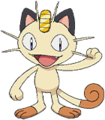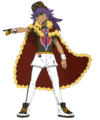Pokémon Journeys: The Series
- This article is about the seventh series of the anime. For its eponymous first season, see S23.
- This article is about the anime series. For its eponymous manga adaptation, see Pokémon Journeys: The Series (manga).
Pokémon Journeys: The Series (Japanese: ポケットモンスター Pocket Monsters) is the seventh series of the Pokémon anime. This anime series is based on the events of all the core series games, including the Generation VIII games Pokémon Sword and Shield. It follows Pokémon the Series: Sun & Moon. It premiered on November 17, 2019 in Japan (although the first episode had a special screening two days earlier) and on June 12, 2020 in the United States.
The series features "double protagonists" Ash Ketchum and Goh, along with their respective partners Pikachu and Cinderace. Similar to Pokémon the Series: Sun & Moon, Ash is based in a single location, alongside Goh, and together they travel around the world, specifically all regions that have appeared in the core series (from Kanto to Galar), and meet Pokémon living in each region while pursuing their respective goals. Ash continues his pursuit of becoming a Pokémon Master by entering the World Coronation Series, with the hopes of one day having an official match with the reigning Monarch, Leon. Goh, having had a fateful encounter with Mew when he was six, dreams of one day catching the Mythical Pokémon, and is currently filling his Pokédex in the hopes that it will get him closer to his dream. The series also features as supporting characters a young girl named Chloe, and her father Professor Cerise, who runs the Cerise Laboratory in Vermilion City.
As with the previous three series of the anime, this series introduces a new art style. For instance, Ash's eyes (both the irises and the overall eyes) are drawn larger, and Team Rocket's eyes are drawn sharper than in Pokémon the Series: Sun & Moon. Overall, the characters are drawn more similarly based on Ken Sugimori's more recent character art. Characters are also consistently drawn with fingernails, like in Pokémon the Series: XY.
Pokémon Journeys is the first anime series to feature episodes split into two different story segments, something that started in Splash, Dash, and Smash for the Crown! / Slowking's Crowning! and continued with Pikachu Translation Check... / Up to Your Neck! and A Rollicking Roll… / Eyes on the Goal!. These episodes have a more comical and "loose" plot from the main anime story.
This is also the first anime series to have special episodes released directly for streaming, with a four-part arc related to Pokémon Legends: Arceus scheduled to be released directly on Japan's Prime Video service.[1]
Episodes in Pokémon Journeys: The Series are numbered with the prefix JN on Bulbapedia. For a complete episode listing, see the list of Pokémon Journeys: The Series episodes.
Dub seasons
When Pokémon Journeys: The Series came to be dubbed into English and other languages, it was divided into seasons, with two so far:
- Pokémon Journeys: The Series (JN001 - JN048)
- Pokémon Master Journeys: The Series (JN049 - Ongoing)
Movies
- Main article: Pokémon movie → Pokémon Journeys: The Series
Home video releases
Japanese DVD releases
Gallery
- For more images, please see artwork from Pokémon Journeys: The Series on the Bulbagarden Archives.
Posters
Characters
Protagonists
Antagonists
Rivals
Supporting characters
Trivia
- The Japanese name for this series retains its original title: Pocket Monsters.
- The design for the Japanese logo of the series is shared with M20 and M21, which are not canon with the main series.
- This also makes it the first series logo to not be colored in any shade of green, being completely blue instead. It is also the first one without any 3D perspective, having a flat 2D design.
- Netflix provides an epilepsy warning at the beginning of each episode after the TV rating chyron, thus marking the second time that the warning has been used outside of Japan, the first time being Mewtwo Strikes Back—Evolution.
- This is the first series:
- To be set in more than two game-original regions.
- To be dubbed by Iyuno-SDI Group (formerly known as Iyuno Media Group) and Goldcrest Post.
- Since Pokémon the Series: Ruby and Sapphire where Ash's outfit is not directly influenced by the male player character's outfit for the concurrent generation.
- In which Ash wears shorts instead of long pants in his standard outfit.
- In which the first Pokémon Ash caught was fully-evolved, was not introduced in the current generation, and was a pseudo-legendary Pokémon.
- In which Ash catches a Ghost-type, baby, regional form, or Fossil Pokémon.
- In which Ash has Mega Evolved one of his Pokémon.
- Other than the original to be put on an extended hiatus; in this case, it was brought on by a production shutdown due to concerns from the COVID-19 pandemic.
- In which Ash only has one traveling companion.
- In which Ash does not have a female traveling companion.
- In which one of Ash's male traveling companions owns a Pokédex.
- In which a main character other than Ash catches all starter Pokémon of the current generation.
- In which Team Rocket owns a Pokédex.
- To feature an episode where Ash and Pikachu are completely absent.
- To feature a movie that is released outside of July, due to the COVID-19 pandemic.
- In which a main character catches a Legendary Pokémon.
- In which two protagonists catch the same Pokémon; with Ash and Goh each catching a Farfetch'd, though Goh catches the Kantonian form, while Ash catches the Galarian form.
- In which a main character owns both a Pokémon's regular form and its regional form.
- In which Ash reunites with his traveling companions from more than one previous series.
- To feature an opening with three different versions in one series.
- Since Pokémon the Series: Black and White to feature a generic eyecatch rather than a guessing segment.
- Pokémon Eggs are given generic designs, contradicting their designs from previous series.
- The first Japanese ending theme of this series was used for 70 episodes, longer than any other Japanese ending.
- This series features the most of Ash's former traveling companions from previous series out of any series, with seven.
In other languages
| Language | Title | |
|---|---|---|
| رحلة البوكيمون: المسلسل | ||
| Chinese | Cantonese | 寶可夢 旅途 Pokémon: Léuihtòuh |
| Mandarin | 寶可夢 旅途 / 宝可梦 旅途 Pokémon: Lǚtú* 寶可夢 Pokémon* | |
| Putovanja Pokemona: Serija | ||
| Pokémon: Cesty – seriál | ||
| Pokémon på rejse: Serien | ||
| Pokémon Reizen: De serie | ||
| Pokémon: Matkat – Sarja | ||
| La série : Pokémon, les voyages | ||
| Pokémon Reisen: Die Serie | ||
| Pokémon: Ταξίδια | ||
| פוקימון: מסעות – הסדרה | ||
| Pokémon Esplorazioni - La serie | ||
| 포켓몬스터W Pocket Monsters W | ||
| Pokémon reiser: Serien | ||
| Pokémon: Podróże – Seria | ||
| Portuguese | Jornadas Pokémon: A Série* Pokémon Jornadas: A Série* | |
| Jornadas Pokémon | ||
| Pokémon: Călătorii – Serialul | ||
| Покемон Сериал: Приключения Pokémon Serial: Prikliuceniia | ||
| Spanish | La serie Viajes Pokémon | |
| La serie Viajes Pokémon | ||
| Pokémon-resan: Serien | ||
| โปเกมอน เจอร์นีย์ Pokémon Journeys โปเกมอน เจอร์นีย์ เดอะ ซีรีส์ Pokémon Journeys: The Series* | ||
| Pokémon Yolculukları: Dizi | ||
| Покемон: Серіал. Мандри Pokémon: Serial. Mandry | ||
| Hành trình Pokémon: Loạt phim | ||
External links
- Official site (Japanese)

|
This article is part of Project Anime, a Bulbapedia project that covers all aspects of Pokémon animation. |























